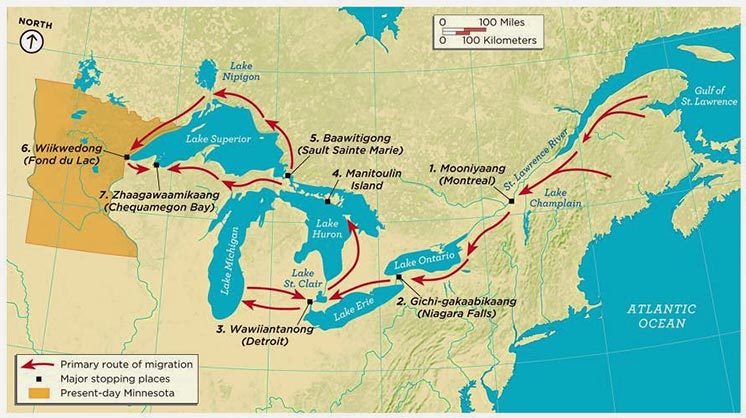“Gichi-aya’aa,” or “Elder” in English, is an Anishinaabemowin word with a deep history and significance specific to the migration from the east coast to the prairies. The concept of an Elder is a very important idea to the Anishinaabe. Miigwech to Robert Horton, Anishinaabemowin Coordinator and Instructor at SGEI for sharing this knowledge.

Translation, Linguistics and Phonetics
Gichi-aya’aa is known as the word Elder in English. It is pronounced “gih-CHIH uh-yuh ‘ AAH.” The word can be broken down into smaller parts for a more detailed linguistic understanding:
- Gichi-: Great
- Aya’aa: A living being
When we look at the word as a whole, it literally translates to “The Great Being,” in English, but the roots reach much deeper.
History
Long ago, the term Michi- was utilized in the same fashion as Gichi- at various times and under certain circumstances. For example, Michi-Mikinaak is an ancient word for the Straits of Michilimackinac, the location at the joining of two large lakes where Anishinaabeg broke into the Anishinaabe nations of the Odawa, Potawatomi, and Ojibwe in 796 AD. The term “Gichi,” actually has an alternative translation that can be traced back to before the migration of the Ojibwe-Anishinaabeg to the Rainy River region from the Eastern seaboard. At this time, the term “Gichi,” referred to the human spirit within the vessel of the body (“Wiiyaw”). More directly, it describes the very nature of that human spirit.
What makes someone an elder?
In Anishinaabemowin, there is a term for an older man (Akiwenzii) and older woman (Mindimooyenh) which hold their own meanings. But the existence of the term Gichi-aya’aa demonstrates that not every older person is what we refer to as an elder.
An elder is not defined by age, knowledge, belief, or gifts. Rather, looking back to the historical translation of “Gichi,” an elder is the heart and spirit and nature of how one treats others and conducts themselves.
What makes someone deserving of the title “Gichi-aya’aa”
An elder’s spirit is said to possess, “Gizhe-Manidoo.” “Gizhe-Manidoo” is the unconditionally kind, charitable, loving, supportive force in creation that gives without expectation, cares and loves equally, and provides in a good way.
The kind nature of the spirit within that elder (manifested in their conduct, behavior, legacy, choices, and relationships to others) is what makes someone deserving of the title “Gichi-aya’aa.”
The title of “Elder” is the nature of one’s heart and spirit and how one treats others. It is not something that is self-proclaimed, but rather others seeing this type of nature of one’s spirit in that individual.
We have many true Gichi-aya’aa in our region who are quite amazing, great, and of the same nature of spirit as the unconditionally kind, charitable, loving, supportive force in creation that gives without expectation, that cares and loves equally, and that provides in a good way. Much love, adoration, and respect to them all.
Engage in culturally enriched education
Are you looking to learn more about Anishinaabe culture? At SGEI, our students can participate in exciting opportunities to learn more about and participate in Anishinaabe traditions, ceremony and practises while completing their education. Learn more about our programs and become an SGEI student today at www.7generations.org.

